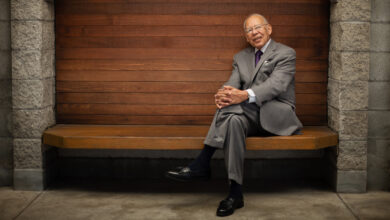Fasting from Food in a Land of Plenty

I stood frozen in the cereal aisle. On either side of me were thousands of boxes and bags of breakfast grains stretched out row after row, in scores of varieties: Vitamin fortified! Extra marshmallows! Cinnamon clusters with organic wheat germ for twice your daily fiber!
For the past four and a half years, I’d been living in another country, limited to the street of local food vendors near my house. I’d walk up and down the market past wriggling eels in gallon buckets, steaming dumplings from a little chrome cart, and gritty bundles of bok choy heaped on a card table. I’d buy only what I could fit in my bags and carry back home on foot. Now, just after moving back to America, I was paralyzed by the excess surrounding me at my local grocery store.
A land of plenty is a strange place to fast from food. And not just because many of us have not known of fasting by necessity, but also because of our underlying cultural assumptions.
On one hand, we embrace the indulgence of hedonism—what the body wants, it must have. We enthrone desire as the highest good, give in to every craving, and let it enslave us. And as a rule, our pleasures are designed for excess. Just as streaming companies encourage binging and smartphones aim for addiction, a lot of what we eat is scientifically engineered to addict us. It’s hard to rightly order our appetites when they have been manipulated by global food conglomerates that profit from excess.
On the other hand, we embrace a modern-day iteration of Gnosticism. Strongly influenced by Platonic and dualist philosophies, we split the physical from the spiritual in a false dichotomy. We elevate the supernatural realm as purer and truer than the corporeal—which we often regard as dirty or even sinful. We diet to excess—patterned after social influencers. For many, the prospect of fasting carries with it the baggage of shame and religious pride, and it can trigger those struggling with disordered eating.
It would be one thing if these lies were only promoted by our culture, but sadly they can also show up in our churches.
A culture of materialism or hedonism in church can look, for example, like a relentless pursuit of higher attendance and a bigger budget to buy nicer facilities. I remember one missionary friend walking into my megachurch auditorium and growing angry. Surveying our gleaming screens, padded seats, and luscious flower arrangements, he said, “The church we planted had to raise money for folding chairs. We’ve met in a basement for 20 years. What does all this tell people about the cross of Christ?”
There is also a myriad of ways the church implies, sometimes accidentally, that our flesh is a problem and that our spirits are the real deal. This might entail judging members who take anti-depressants for their lack of faith—or an elder board that won’t fund a mission to dig wells overseas unless they are assured the gospel will be presented at the same time. Churchy Gnosticism makes bodies problematic, or at the very least inferior to whatever we mean by souls.
These two opposing lies—which lead us to either exalt or neglect our bodies—profoundly inform our habits around food. And for Christians, the spiritual discipline of fasting offers a powerful third way, and it speaks truth against our favorite lies about our bodies.
Ever since stumbling in, and out, of Anglicanism years ago, I’ve given up some creative things for Lent: scrolling Instagram, church gatherings, using my phone after 5 p.m., or even one year, adding unnecessary comments to conversations. Ever the individualists, we like to invent bespoke abstentions. And although there’s no doubt these can serve useful purposes in our lives with God, I keep returning to fasting from food in the context of community because of the way it targets our cultural lies.
Food fasting has been considered a traditional Christian habit throughout time and around the world. On John Mark Comer’s podcast, one Ethiopian guest described how she grew up fasting with her Christian community from sunup to sundown for 50 days. Another guest joyfully described the keen awareness of the Spirit he usually gets on the 14th day of a fast.
That sounds so cool, but I am not there yet. When it comes to food fasting, I’m still a beginner—still figuring out how to prayerfully skip three meals with any sort of regularity. And as I’m trying to put it into practice, I’m also looking to learn from others about the spiritual purpose of the habit.
Nineteenth-century missionary Hudson Taylor learned much about fasting from the Shansi Chinese believers. “Since it makes one feel weak and poorly,” Taylor observed, fasting “is really a Divinely appointed means of grace. Perhaps the greatest hindrance to our work is our own imagined strength. In fasting we learn what poor, weak creatures we are, dependent on a meal of meat for the little strength which we are so apt to lean upon.” It seems God loves to fill the weakness fasting reveals in us.
I’m also discovering that self-denial in our eating can develop our muscles for heavenly battle. As Robert Moll says, the “habit of denial strengthens our ability to take up the cross as even our very bodies are molded into the likeness of Christ.” I’ve noticed that when I’m fasting, I’m able to resist my pet temptations more robustly. It reminds me of being back in college when I’d lift leg weights in the gym so that I could run faster and kick harder on the soccer field.
Even Jesus experienced physical abstinence as a way to spiritual strength. After the Spirit led him to fast for 40 days, bathing in his Father’s affirmation, Jesus was ready to meet the Devil in the desert.
Food fasting can also make us aware of our poor eating habits as a society. Many of us scarf dinner alone in front of a show or grab fast food between one thing and the next in our busy schedules. We overindulge and we throw out a lot. For what I have eaten, and left uneaten, I feel truly sorry.
After all, what does it matter if I swear off excess only to leave a brother or sister in need empty? What would it look like to fast not only for the right ordering of my body and spirit with God but for the just practices of my neighborhood?
Our gluttony and our unhealthy self-deprivations both occur in an age of real hunger. One in 8 Americans experience food insecurity—in other words, they don’t have enough money to eat as much as they need. The number of hungry humans that surround overstuffed food stores grieves me. In the world’s wealthiest country, some people still starve.
Many believers have used Lent or other fasts to align themselves with the hungry—to raise awareness or money for the poor, and to remember to pray for those in need. Some friends of mine spent one Lent eating nothing but rice and beans in solidarity with those who have no other options. Every time we feel our stomachs grumble, our hunger can serve as a Post-it note reminding us to pray for those in need.
Communal, poverty-aligned fasting can move us beyond our egocentric view—seeing it as an individual spiritual practice—and open our eyes to the experiences of all those outside our bubble. Far from indicting it as performative, the prophet Isaiah praises the kind of fast wherein we “free those who are wrongly imprisoned … share [our] food with the hungry and give shelter to the homeless” (Is. 58:6–7).
As far as my personal experience of fasting, it varies wildly. I never know how holy hunger is going to affect me. Sometimes my body feels like a clear vessel overflowing with the Holy Spirit. I can feel God’s love for his world pulsing out in all directions; I get clarity and breakthroughs, and my prayers seem to “availeth much” (James 5:16, KJV). Other times when I fast, I just get cranky—I obsess over the food I’m missing, get a headache, and feel like everything is stupid.
But whether I feel the spiritual significance or not doesn’t change the value of the fast. It’s one of those disciplines by which, as Richard Foster points out in his classic book Celebration of Discipline, we carve out a dedicated space (the body) and a dedicated time (say, Wednesdays from 6 a.m. to 6 p.m.) for God, into which he is welcome to enter. While my motives for fasting matter, I don’t have to get all my sanctification ducks in a row to do it.
My fasts are all over the place, lopsided in motivation, sometimes—ahem—shorter than intended, and never that impressive. When I offer my body to God with fasting, it’s a messy gift, as if a toddler grabbed some crayons, scribbled a picture, and thrust it into her dad’s hands. Fasting says, Here! Here are my addictions and dependencies, my pleasures and cravings, my weakness, and what little strength I have. Do you want it? And he does!
With our fasting, God undertakes to free us from the cruelty of asceticism and the paralysis of indulgence. Fasting attacks both my inner hedonist and my inner dualist, who snobbishly dismiss the material world as less important than the spiritual realm. As we offer our bodies as living sacrifices, God does what neither hedonism nor Gnosticism can do: He values our bodies and our bodily self-control. And he calls our physical sacrifice holy.
Fasting both renews our awareness of our bodies’ spiritual significance and honors our bodies as lovingly crafted, lavishly supplied, sacred spaces to rendezvous with God.
God doesn’t see our bodies as secondary or irrelevant. From the moment God mixes dust with divine breath to form Adam, the Bible presents humans as integrated, holistic selves. Jesus came as the Word made flesh. He fed empty stomachs and he preached sermons. He healed physical sickness and he forgave sins. The Messiah treated every part of his fellow human beings as significant.
Likewise, God intends for our bodies and spirits to be inextricably braided together. Fasting rejoins our spirits and our bodies, the pneuma and the soma. With a fast, we put God back in charge of our desires and ask him to be better than whatever we’re craving. We humbly ask that his kingdom reign in our bodies.
Graciously, he also reveals the communal nature of our attitudes and actions around eating, and he invites us to “act justly” (Mic. 6:8) when it comes to food. God cherishes human bodies, all made in his image. They are part of his kingdom plan. He cares about our food: what we do and do not eat, and why, and with whom. He cares about our bellies and our grief—both the meal and the hungry man on the sidewalk. Not only that, but his promise of redemption will one day transform it all.
To one newly repatriated American, overwhelmed in the cereal aisle, all that is very good news—that’s the gospel.
Jeannie Whitlock is a freelance journalist and poet in the Chicago suburbs who writes about holy embodiment in all its diverse ramifications.




